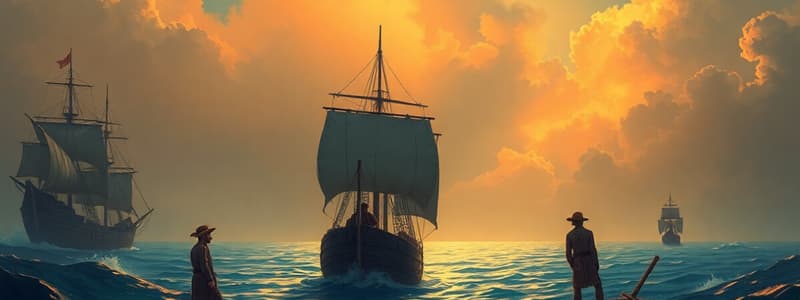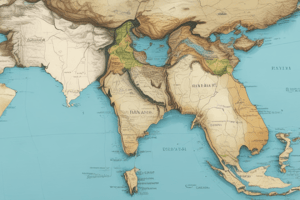Podcast
Questions and Answers
Pirates in the 1690s primarily attacked Christian shipping.
Pirates in the 1690s primarily attacked Christian shipping.
False (B)
Frederick Philipse became the richest man in New York due to his investments in piracy.
Frederick Philipse became the richest man in New York due to his investments in piracy.
True (A)
Henry Every successfully captured the Mughal emperor's flagship, the Ganj-i-Sawai.
Henry Every successfully captured the Mughal emperor's flagship, the Ganj-i-Sawai.
True (A)
The East India Company was pleased with Henry Every's piracy actions.
The East India Company was pleased with Henry Every's piracy actions.
Kidd was executed in 1701 as a direct consequence of his piracy activities.
Kidd was executed in 1701 as a direct consequence of his piracy activities.
William Kidd was originally commissioned to be a pirate.
William Kidd was originally commissioned to be a pirate.
New York was not considered an important shelter for pirates during the late 1600s.
New York was not considered an important shelter for pirates during the late 1600s.
Madagascar served as a lawless territory that attracted both pirates and illegal traders for commerce.
Madagascar served as a lawless territory that attracted both pirates and illegal traders for commerce.
Piracy had little connection to colonial societies and cultures in the Atlantic world.
Piracy had little connection to colonial societies and cultures in the Atlantic world.
Most of Henry Every's crew were captured after the Ganj-i-Sawai incident.
Most of Henry Every's crew were captured after the Ganj-i-Sawai incident.
Acts of Parliament imposed restrictions on piracy after 1695 but were largely ineffectual in stopping it.
Acts of Parliament imposed restrictions on piracy after 1695 but were largely ineffectual in stopping it.
The crew of the Batchelor's Delight received a modest payout from their voyage.
The crew of the Batchelor's Delight received a modest payout from their voyage.
Madagascar was only a temporary haven for pirates.
Madagascar was only a temporary haven for pirates.
Colonial trade from British North America was often mediated by pirates.
Colonial trade from British North America was often mediated by pirates.
The English East India Company was the only trading company involved in the Indian Ocean by the 1690s.
The English East India Company was the only trading company involved in the Indian Ocean by the 1690s.
Many pirates in the Indian Ocean were considered outcasts in their colonial societies.
Many pirates in the Indian Ocean were considered outcasts in their colonial societies.
Piracy was condemned uniformly across all colonial societies in the Indo-Atlantic World.
Piracy was condemned uniformly across all colonial societies in the Indo-Atlantic World.
Pirates frequently thought of the Atlantic and Indian Oceans as discrete entities.
Pirates frequently thought of the Atlantic and Indian Oceans as discrete entities.
The arrival of European pirates in the eastern Indian Ocean increased in the late 1600s.
The arrival of European pirates in the eastern Indian Ocean increased in the late 1600s.
Violence in the Indian Ocean was largely due to a lack of desirable trade goods for Europeans.
Violence in the Indian Ocean was largely due to a lack of desirable trade goods for Europeans.
Piracy was always a permanent career choice for those who engaged in it.
Piracy was always a permanent career choice for those who engaged in it.
Flashcards
Colonial Origins of Indian Ocean Piracy
Colonial Origins of Indian Ocean Piracy
European colonial activities, driven by trade and expansion, inadvertently contributed to the rise of piracy in the Indian Ocean. Companies like the English East India Company sought to control trade, but pirates often exploited existing networks to bypass these monopolies.
Trading Companies & Violence
Trading Companies & Violence
European trading companies often used violence and extortion, similar to piracy, to secure trade routes and goods in the Indian Ocean, even before significant pirate activity.
Slave Trading & Pirate Settlements
Slave Trading & Pirate Settlements
The slave trade played a significant role in the establishment and growth of pirate settlements in the Indian Ocean. Pirates often involved themselves in the trade, highlighting the complex connection between these activities
Henry Every(Avery)
Henry Every(Avery)
Signup and view all the flashcards
Indo-Atlantic Pirates
Indo-Atlantic Pirates
Signup and view all the flashcards
Informal Networks of Trade
Informal Networks of Trade
Signup and view all the flashcards
Pirates and Colonial Society
Pirates and Colonial Society
Signup and view all the flashcards
Piracy as a Spectrum
Piracy as a Spectrum
Signup and view all the flashcards
Pirate Profitability
Pirate Profitability
Signup and view all the flashcards
Colonial Piracy Sources
Colonial Piracy Sources
Signup and view all the flashcards
Madagascar as a Pirate Hub
Madagascar as a Pirate Hub
Signup and view all the flashcards
Henry Every's Success
Henry Every's Success
Signup and view all the flashcards
Mughal-English Conflict
Mughal-English Conflict
Signup and view all the flashcards
William Kidd's Commission
William Kidd's Commission
Signup and view all the flashcards
EIC influence
EIC influence
Signup and view all the flashcards
Pirate wealth examples
Pirate wealth examples
Signup and view all the flashcards
Kidd's fate
Kidd's fate
Signup and view all the flashcards
Piracy in Colonial America
Piracy in Colonial America
Signup and view all the flashcards
Global Piracy
Global Piracy
Signup and view all the flashcards
Colonial Piracy Challenges
Colonial Piracy Challenges
Signup and view all the flashcards
Piracy and Colonialism
Piracy and Colonialism
Signup and view all the flashcards
Study Notes
Atlantic Piracy, 1500-1865
- Lecture 10 covered Atlantic pirates, specifically focusing on the Indian Ocean.
- Colonial trade routes and violence played a part in piracy.
- Slave trading and pirate settlement were connected.
- Noted figures include Henry Every (Avery) and William Kidd.
Lecture Outline
- Colonial origins of Indian Ocean Piracy were discussed.
- The role of trading companies and resulting violence was examined.
- The connections between slave trading and pirate settlements were analyzed.
- Key figures like Henry Every (Avery) and William Kidd were highlighted.
From New York to Madagascar
- Colonial trade from British North America.
- Trade was steered by chartered companies (like the English East India Company).
- Colonial trade often bypassed chartered companies and was mediated by pirates.
- New York, Providence, and Boston were significant hubs in this trade.
- Informal networks of trade in the Indo-Atlantic World were discussed.
- These networks enabled colonists to buy East India goods, including slaves.
- The plantation and capital economy of the Atlantic system benefitted from this.
- This trade circumvented the monopolies of Portuguese, VOC, and EIC traders.
- Piracy ignored regional and oceanic distinctions.
Violence and Piracy in the Indian Ocean
- European behavior in the Indian Ocean resembled piracy.
- A lack of desirable trade goods and existing powerful merchant networks made piracy appealing.
- Trading with Europe was largely dominated by powerful companies by the 1690s.
- English, French, and colonial pirates were active in the region in the late 1600s.
- Factors influencing piracy behavior include push and pull factors, like being forced out of the Caribbean or other economic pressures.
- Pirates pursued wealthy prizes and home community factors, including practical and religious reasons.
Indo-Atlantic Pirates
- Many pirates were well-integrated into colonial society, not outcasts.
- Contraband trading was widely acceptable to merchants and elites in New York, Providence, and other areas.
- Piracy was a spectrum and people moved in and out of it.
- Merchants and traders often worked with pirates.
- Pirates had familial and economic connections within colonial hierarchies.
- Distance and religious justifications sometimes made piracy acceptable to colonists.
- Attacks on Muslim shipping were sometimes not objectionable.
- Their success was a challenge for England and Mughal India.
Madagascar and Red Sea Pirates
- A no-man's land between two trading monopolies (Royal Africa Company and English East India Company).
- Cheaper slaves and luxuries were available in Madagascar; colonial traders could purchase slaves and luxuries there.
- Large pirate and slaving communities sprang up.
- Piracy became highly lucrative in the 1690s.
- Privateering often started in North American colonies.
- Trading or privateering between islands was common.
- Merchants like Frederick Philipse significantly profited from investing in Red Sea piracy.
- Individual sailors could also profit heavily.
The Greatest Robbery? (Henry Every)
- Likely had experience in the Royal Navy and sailed as a South Sea buccaneer.
- In 1694, stole a ship via mutiny, went to the Indian Ocean.
- Joined a pirate group.
- Captured a major ship, the Ganj-i-Sawai, owned by the Mughal emperor Aurangzeb.
- Crew dispersed, likely with Mughal coins.
- One crew member married the Pennsylvania governor's daughter, some crew members were captured and tried for piracy but acquitted.
- The East Indian Company lobbied for another trial which successfully convicted all six captured pirates.
- Every himself escaped capture.
Pirates and Pirate Hunters (William Kidd)
- Commissioned to hunt pirates in the Indian Ocean in 1696.
- Experienced raiding shipping but couldn't match Every's success.
- Returned to New York to hide his loot and later, surrendered to a voyage sponsor.
- Faced trial and was subsequently hanged in 1701.
- Considered as a sacrifice to appease the East India Company for Every's actions
Local Conditions and Global Piracy
- Kidd and Every exemplified "global" piracy but remained tied to Atlantic world and port communities.
- Pirates relied on North American port towns for supplies, rest, shelter, and selling stolen goods.
- New York, Philadelphia, Newport, Boston, and Charleston were increasingly important shelters for pirates.
- Colonial governance made it challenging to curb piracy.
- Laws attempted to regulate piracy but met with resistance.
- Madagascar continued to be a haven.
Some Conclusions
- Piracy was central to early modern colonialism.
- Commercial concerns and raiding were deeply intertwined.
- Pirates were often integrated into colonial societies, including those in Madagascar and North America.
- Slavery and slave trading were connected to piracy networks.
- Imperial responses (Mughal and English) emerged when piracy threatened inter-imperial conflict.
Studying That Suits You
Use AI to generate personalized quizzes and flashcards to suit your learning preferences.




